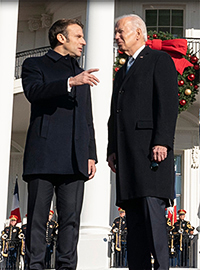| Resist Dangerous Political Theater and Look to 'That Which Is Not Seen' |
 |
|
By Veronique de Rugy
Thursday, June 01 2023 |
Too many politicians are thespians. When there's a conflict – as there often is – between appearing to solve problems and actually helping to solve those problems, politicians can almost always be counted on to put appearance over substance. Unfortunately, politicians succumb to this bias even when their theatrics make real problems worse. Consider French President Emmanuel Macron's boast last week that his government banned many flights between cities within 2.5 hours of each other by rail. Nothing today is more en vogue than climate theatrics, sometimes at the expense of realistic, helpful policies. Macron obviously relishes the opportunity to pose as a courageous hero astride a white horse helping to save humanity from its self-destructive addiction to fossil fuels. As pointed out by many observers, France's ban on short-haul flights is riddled with so many exceptions that the resulting reduction of carbon emissions will fall far short of what Macron wants the world to believe. Nevertheless, maybe some flights will be banned and less aviation fuel will be burned. Hooray! At least it's something! But before you get too excited, let me tell you about another French figure: Frederic Bastiat, an economist and statesman who was active in the middle of the 19th century. Bastiat's most famous writing is a wonderful essay titled "That Which Is Seen and That Which Is Not Seen." In it, he urged people to look beyond the immediate effects of government intervention. When you do so, and when you think about more than what government officials triumphantly trumpet, you'll often discover additional consequences that no one wishes to take credit for. In the case of the ban on short-haul flights, it's easy to see what Macron sees and wants: more people traveling by train. Let's grant that this effect is good and then look beyond the initial claims about saving aviation fuel. What about more people traveling by automobile? After all, rail travel isn't the only alternative to air travel, especially in France where train strikes are a regular occurrence. Denied the much greater speed of air travel, many people will opt to skip the inconvenience of buying a ticket altogether and travel by car. One undesirable effect is a longer time spent traveling. Because people's time is valuable and could otherwise be spent working, studying or with family and friends, the cost of traveling what the French government considers to be short distances will rise. Did Monsieur Macron carefully weigh this cost against the ban's benefits? I'm pretty sure he didn't. He just assumed that people's time is of sufficiently low value to justify the flight ban. Tres arrogant! Looking even further past "that which is seen," you'll see why any reduction in the burning of fossil fuels will almost certainly be less than what the French government hopes. Not only do automobiles, like airplanes, burn fossil fuel, but the amount burned by automobiles can be greater per passenger mile. On average today for commercial aircraft, one gallon of fuel carries each passenger about 67.1 miles. The typical French automobile sold in 2019 gets about 42.8 miles per gallon. These facts means that if someone in France chooses to drive alone in one of these cars – say, from Paris to Nantes – rather than traveling by train, he will burn 57% more fuel than he would have while flying. And even if there are two people on this car trip, the amount of fossil fuel burned per person will be only about 22% less than if these two travelers had instead flown. This math may still lead many readers to jump to the conclusion that at the very least, piling three or more people into a car for that same trip will be desirable. But peering one more step beyond that which is seen counsels against this. Here we finally see the most frightening "unseen" consequence of the short-haul flight ban: the likelihood of more roadway deaths. A recent study out of Harvard University found that, for people traveling within the United States, Europe and Australia, the chances of being killed while flying are 1 in 11 million, while the chances of being killed while driving are 1 in 5,000. Put differently, you're 2,200 times more likely to be killed when traveling by car as opposed to by airplane. By diverting some travelers from the air to the roadways, the French government will almost certainly cause more travelers to die. Political theater, it turns out, can be deadly. Veronique de Rugy is the George Gibbs Chair in Political Economy and a senior research fellow at the Mercatus Center at George Mason University. COPYRIGHT 2023 CREATORS.COM |
Related Articles : |
























